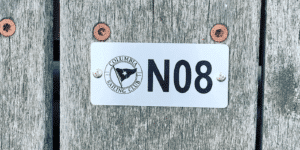For companies in the chemical industry, one of the best ways to reduce the risk of accidents is to clearly label hazardous materials and make sure employees have immediate access to critical safety information. It’s also important to label machinery and ensure employees understand how to operate it safely. Unfortunately, adhesive decals are made of paper that disintegrates over time. The ink on these labels can also fade, making it difficult to make out what they say.
Chemical tags made from metal eliminate these problems, as they’re extremely durable and embossed with the information employees need to do their jobs safely. These are just a few of the ways metal tags are used in the chemical industry.
Equipment Identification
The equipment used in the chemical industry is complex, making it expensive to purchase and maintain. Many items also have gears, blades and other hazardous parts, which can cause serious injuries if employees aren’t aware of the potential dangers. Many chemical companies use metal tags to provide important information about each piece of equipment, such as the serial number, date of manufacture and relevant safety warnings. These tags are affixed directly to the equipment, eliminating the need for employees to search for the information they need to operate each item according to company standards.
Inventory Management
Chemical tags are also extremely useful for inventory management within companies of all sizes. Paper labels wear out quickly, and it can be difficult to read what a paper label says if it gets wet. Employees need to be able to identify chemicals quickly and determine where to store them, making traditional labels less than ideal when it comes to inventory management. In contrast, metal chemical tags can be embossed with the product’s name and other important information, ensuring employees always know which chemicals they’re handling. It’s also possible to turn a metal tag into a UPC code or QR code, making it easier to automate inventory management functions.
Legal Compliance
Chemical companies must follow stringent safety regulations to ensure their products don’t cause harm to employees, customers or vendors. For example, the Occupational Safety and Health Administration has chemical labeling standards that all covered companies must follow. According to these standards, all chemicals shipped after June 1, 2015, must have a label with the following components:
- Company contact information
- Product identifier
- Hazard statement
- Signal word
- Precautionary statement
- Pictogram
Pictograms are symbols used in place of words and phrases. With a pictogram, it’s easy to communicate safety information quickly, and it also makes it possible for people who speak different languages to understand that the product is hazardous. Chemical tags are often used to indicate that certain chemicals are carcinogenic, flammable or corrosive, for example.
When it comes to legal compliance, metal tags are the best option because they’re durable and easy to read. You don’t have to worry about ink fading in the sun or running if a label gets wet when it’s loaded, while it’s in transit or when it arrives.
Safety Management
For department managers, safety management is a critical responsibility. Safety management procedures are about more than reducing the risk of accidents; they’re about managing risk throughout the organization, making safety management essential for success in the chemical industry. Safety management typically involves identifying workplace risks and implementing mitigation strategies, creating processes to identify new hazards, focusing on process improvement and ensuring all members of the organization communicate effectively about safety issues.
Chemical tags can be used for a variety of safety management applications. If employees need to follow certain verification procedures to mitigate risk, those procedures can be documented on a metal tag affixed to the machine or container in question. Instead of searching through thick binders full of safety-related documents, employees can simply look at the metal tag to get the information they need.
Some equipment can only be operated under certain conditions, such as a minimum or maximum temperature. Operating outside these limits increases the risk of injury, making it essential for chemical companies to communicate critical limits to employees. Documenting these limits in a handbook or manual is a good first step, but it’s not enough to ensure every employee who uses the equipment will see important safety information at the right time and place. Chemical tags make it easier to communicate critical limits to employees, reducing the risk of injuries associated with operating equipment under unsafe conditions.
Fraud Detection
Asset misappropriation is one of the most common types of fraud committed by employees. This term doesn’t just apply to outright property theft; it’s also used to describe the misuse of company property for personal gain. Although internal controls can’t stop 100% of asset misappropriation, appropriate controls make it easier to detect fraud when it occurs. For chemical companies, asset misappropriation can cost millions of dollars, especially for companies that work with highly specialized manufacturing equipment.
One way to reduce the risk of fraud is to keep track of every asset. Many companies use adhesive labels that can be applied to a variety of surfaces, but these labels are easy to remove. Employees engaged in fraud may also avoid detection by switching labels or writing over adhesive labels, making it difficult to determine if asset misappropriation has occurred. Chemical tags made of metal, on the other hand, are affixed directly to company assets. They’re not easy to remove or alter, preventing employees from taking assets home or using them for personal gain.
Metal Marker Manufacturing has extensive experience producing chemical tags that are durable and contain all the information you need to track inventory, prevent workplace accidents and comply with relevant regulations. To learn more or order custom metal tags for your business, call us at (800) 428-0095.









